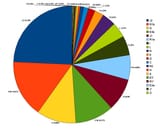>>515074287
>In a 2015 study, Turkish samples were in the West Eurasian clade which consisted of "all of mainland Europe, Sardinia, Sicily, Cyprus, western Russia, the Caucasus, Turkey, and Iran, and some individuals from Tajikistan and Turkmenistan." In this study, ancestry from East Asia was also visible in Turkish samples, with events after 1000 CE generally involving Asian sources being important when it comes to the ancestry of Turkey and its region
>As of 2017, Central Asian genetic variation has been poorly studied, with little or no whole genome sequencing data for countries such as Turkmenistan and Afghanistan. Therefore, future comprehensive genome-wide studies are needed. Turkish people, and other Western Asian populations, may also be closely related to Central Asian populations such as those near Western Asia
>A 2021 study which looked at whole genomes and whole-exomes of 3,362 Turkish people found that the most common Y chromosome haplogroups were J2a, R1b, and R1a (18.4%, 14.9%, and 12.1% respectively). Haplogroups C-M130 and O3 ranged from 8.5% to 15.6%. Most common mtDNA haplogroups were H, U, and T (27.55%, 19.53%, and 10.99% respectively)
>An earlier 2004 study of 523 people found many Y-DNA haplogroups in Turkey. Most haplogroups in Turkey are shared with its West Asian and Caucasian neighbors. The most common haplogroup in Turkey is J2 (24%), which is widespread among Mediterranean, Caucasian, and West Asian populations. Haplogroups that are common in Europe (R1b and I; 20%), South Asia (L, R2, H; 5.7%), and Africa (A, E3*, E3a; 1%) are also present. By contrast, Central Asian haplogroups (C, Q, and O) are rarer. While, K, R1a, R1b, and L infrequently occur in Central Asia, they are notable in many other Western Turkic groups. J2 is also found in Central Asia, a notably high frequency (30.4%) being observed among Uzbeks
